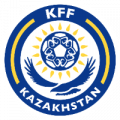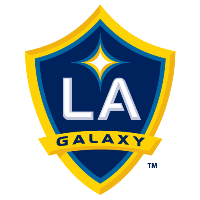
Los Angeles Galaxy
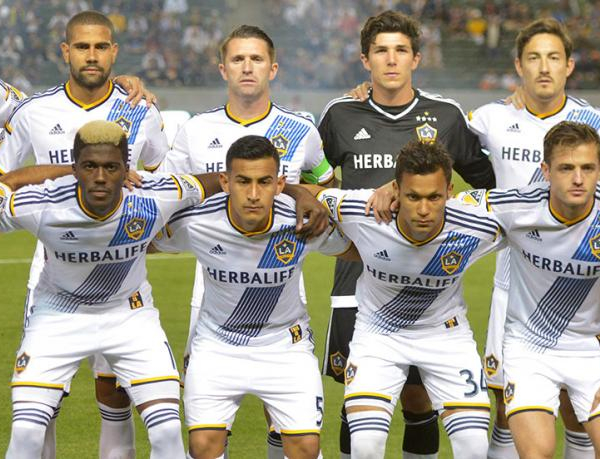
1994 Carson
"Thank you, Beckham!" Ch-Ch. Ch-Ch-Ch. "Thank you, Beckham!" Ch-Ch. Ch-Ch-Ch.
The one and only true SuperClub of Major League Soccer (MLS), the Los Angles Galaxy, or LA Galaxy, are one of, if not the most recognizable soccer brands in the western hemisphere. And while much of that certainly comes down to David Beckham's time with the Galaxy, they have also had a plethora of other world stars don the crest of one of MLS’ founding members.
From Landon Donovan to Steven Gerrard, to Zlatan Ibrahimovic, the Galaxy have dominated MLS with star power on and off the field. The Galaxy runs MLS so much so that they are the only team to have earned a gold star above its crest on jerseys, representing the five MLS Cups won in club history and the most by any club in the league's history.
The Galaxy are without a shadow of the doubt, the face of MLS and American club soccer.
Early Dominance
MLS began play in 1996 after a stipulation from FIFA required the creation of an official top tier league in the United States following the 1994 World Cup held in the US. And the Galaxy was one of the 10 founding members of the new Major League Soccer. The Galaxy started in and remain in the Western Conference, one of MLS' two conferences which divide the teams in half for postseason playoffs and the unbalanced schedule commonly seen in American sports, but rare in world soccer.
From the get-go the Galaxy flexed their muscles in the new American league, winning the conference in their inaugural season with a record of 19 wins and 13 losses. In its first few seasons, MLS did not have draws for fear of alienating American fans unfamiliar with or disillusioned by games ending in a tie. Led by Ecuadorian striker Eduardo Hurtado, the Galaxy made their way through the regular season and into the playoffs with the top seed. And advancing via a penalty shoot-out in the conference finals, they reached the first MLS Cup to take on DC United of the Eastern Conference, losing 3-2 after extra time to the Capital based side. However, that was a sign of good things to come for the Galaxy.
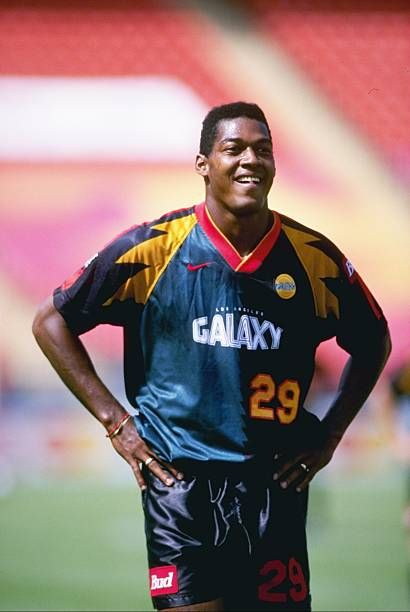
The conference title qualified them for the preliminary round of the 1997 Concacaf Champions Cup, the then-regional tournament in North America analogous to UEFA's Champions League in Europe. After beating Santos Laguna to reach the eight-team, two-week-long tournament held in Washington DC, the Galaxy bowed out in the semifinals. And again, it came at the hands of DC United. Domestically, though, the Galaxy enjoyed more success winning the Western Conference in five of the league's first seven seasons from 1996-2002, two of those years winning the Supporter's Shield with MLS' best record overall.
The first true piece of silverware came for the club in the 2001 season. The Galaxy qualified for that year's Concacaf Champions Cup after losing to DC United once again in MLS Cup the previous season. This time with the competition taking place in January and nearly on home soil in Fullerton, CA just outside LA, the Galaxy topped Honduran side Real España in the quarterfinals after spot-kicks. In the semis at the LA Coliseum, they finally avenged their multiple losses by beating DC United, also on penalties, to reach the final. In the final also at the Coliseum, another Honduran side, Olimpia, took the lead on a penalty in the 34th minute. But the Galaxy quickly responded, drawing level just two minutes later. Another three minutes after the first goal, American legend Cobi Jones gave the Galaxy the lead. In the second half, Olimpia leveled early on before Ezra Hendrickson won the game with a 78th-minute goal, sealing the Galaxy's first trophy in club history.
Later in the 2001 season, the club saw more success with their first double as they won their first US Open Cup, the knockout tournament similar to England's FA Cup or La Liga's Copa Del Rey. However, they did lose to the San Jose Earthquakes in MLS Cup at the end of the season, narrowly missing out on completing the treble.
The 2002 season is where the Galaxy cemented their place early as kings of MLS. The team started off slow, with a 5-5-2 record (MLS began allowing draws during the 2000 season), but picked it up after that. With a 16-9-3 record, the club won the Western Conference and Supporters Shield led by Guatemalan forward Carlos Ruiz in his first season in MLS. El Pescadito, as he was known, hit 24 goals and added an assist helping the Galaxy cruise through the second half of the season. And come the playoffs, it was much of the same. Ruiz scored eight of the Galaxy's 15 playoff goals taking them to their second MLS Cup appearance in a row and fourth overall. Traveling to face the New England Revolution in their home stadium, although it was chosen as the neutral site venue beforehand, the Galaxy wanted to finally get the monkey off their back. Ruiz, of course, came to the rescue, scoring the winner in extra time. With their first MLS Cup win, the Galaxy were paving the way to becoming the most successful club in the league.
In 2005, they added their first domestic double by beating FC Dallas in the US Open Cup and then toppling the Revolution once again in MLS Cup, this time in FC Dallas' stadium as the neutral site. With the trophy cabinet expanding nearly every season, the club was quickly becoming the face of MLS as its most decorated side. But just around the corner was something, or someone, about to rocket them up into another stratosphere.
The Beckham Years (2007-12)
In 2007, the Galaxy unquestionably became the face of MLS and American soccer as David Beckham joined the club from Real Madrid that summer. Beckham's arrival brought an expected spotlight onto the league and club, of course. But no one could have ever anticipated just how big the fan and media fervor would become. Beckham's introductory press conference, his first match, and practically everything he did on and off the field became either sports news or gossip news.
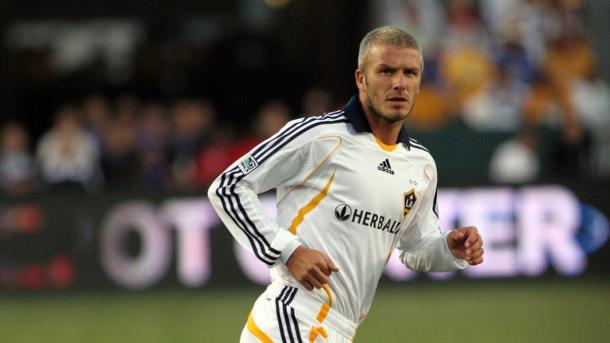
Beckham's first game with the Galaxy, at home against Chelsea in a friendly, brought unprecedented excitement for club soccer in America. And to cover it, broadcaster ESPN threw out arguably its most intense coverage of a soccer game ever seen in the country, even dedicating one camera to watching Beckham the entire 90 minutes. However, for most of those 90 minutes, Beckham sat on the bench as he nursed an ankle injury picked up with Madrid before arriving across the pond. The first half-season of the Beckham era did not go as planned on the field for any parties involved as the Englishman's injury never quite healed and the team did not qualify for the playoffs for only the second time in club history, also the second year in a row. Off the field, though, Beckham's joining the Galaxy was a wild success. With the most famous athlete in the world now donning the white Galaxy jersey, the team practically turned into the LA Globetrotters playing friendlies during the season all around the country and around the world during the offseason. With Beckham playing for the Galaxy, together they put butts in seats, smiles on faces, and dollars in their pockets.
The first full season of the Beckham era, 2008, didn't go as well as hoped on the field again. Ruud Gullit was hired as the new manager to replace Frank Yallop, but without much success. The Galaxy missed the playoffs once again, even after firing General Manager Alexi Lalas and replacing Gullit with American coach Bruce Arena towards the end of the season. After two straight years of disappointment on the field, the rumors of Beckham's departure, only 18 months into a five year, had started to surface. During the winter between the 2008 and 2009 seasons, the Galaxy was about to lose both Beckham, to AC Milan, and Landon Donovan, to Bayern Munich on loan. Beckham's move was based on his desire to still play for England at the 2010 World Cup, and in order to do that, he needed to play at the highest levels in Europe. Initially, the Galaxy only wanted to allow him to play for Milan until the new MLS season started in March, but the club eventually agreed to let him see out the end of the season in Italy. Donovan, on the other hand, joined Bayern for a couple of months making just a handful of appearances and returned to LA before the start of the MLS season in March.
2009 saw the first bit of on-field success during the Beckham era. While the Englishman continued in Milan, the Galaxy struggled to open the season, but improved in the summer when Beckham joined the ranks. The Galaxy won the Western Conference and meandered its way through the playoffs to reach yet another MLS Cup final. Unfortunately, though, the Galaxy lost on penalties to Real Salt Lake in Seattle at Qwest Field. The Beckham era continued in 2010, but without Beckham for most of it after he ruptured his Achilles while on loan with Milan again, ensuring he’d miss the 2010 World Cup. The Galaxy went on to one of their best statistical seasons on the field in club history as the won the Supporter's Shield again with the best record in the league. However, they lost in the conference finals, just one match away from another MLS Cup. And in the Concacaf Champions League, they didn't fare much better, exiting in the quarterfinals.
Ahead of the 2011 season, rumors of Beckham's potential exit from the Galaxy started again. However, he remained in LA as one of three making up arguably the most star-studded attack in MLS history and possibly the entire Americas. Landon Donovan, America's greatest player, was at the peak of his career, fresh off the 2009 Confederations Cup semifinal win over they mighty European Champions Spain and the final loss to Brazil, plus the 2010 World Cup group stage winner over Algeria that not only sent the US to the knockouts but won them the group over England. Coupled with him was Beckham of course, but also new signing and Irish legend Robbie Keane who arrived at the end of the summer.
That season, the Galaxy amassed the second-highest points total in MLS history up to that point, 67, only one behind the 1998 Galaxy season (the Galaxy's 68 points in 1998 included points for winning shootouts after ties) with Donovan leading the way with 12 goals in the league. The Galaxy completed a clean sweep of MLS winning the Western Conference, Supporter's Shield again, and eventually, MLS Cup. Donovan scored the winner over the Houston Dynamo in the second half of the 1-0 win and for the first time, the Galaxy won in front of their home fans at Home Depot Center, although technically the preselected neutral site, in Los Angeles. For Donovan, it was his fourth MLS Cup victory split between the Galaxy and San Jose Earthquakes. As for Beckham, it was his first piece of silverware in America, but more importantly, it was the first triumph of the Beckham Era for the Galaxy. And for all intents and purposes, it was also the first triumph for MLS in the Beckham Era.
Speculation surrounded Beckham's tenure at the Galaxy once again in the offseason, assuming he would depart a Champion, the perfect bow on his legacy in MLS. However, in January he signed a new two-year deal, committing the short term to the Galaxy. In 2012, the Galaxy went to defend their title with Donovan, Beckham, and Keane spearheading the attack once again. The Galaxy qualified for the playoffs in a tough Western Conference and navigated its way to another MLS Cup. This time, though, they hosted the first MLS Cup awarded to the participating team with the higher regular-season points total. And once again, the Galaxy took down the Dynamo thanks to goals from Omar Gonzalez, Donovan, and Keane. With the victory, the Beckham Era at the Galaxy made it three Western Conference titles, two Supporter's Shields, three MLS Cup appearances, and two MLS Cup victories. And with the back to back titles, Beckham decided to end his time with the Galaxy having forever changed the soccer landscape in America and bringing an unimaginable amount of eyeballs, interest, and dollars to both the Galaxy and MLS. He raised two MLS Cups on the field and exponentially raised the interest and fan excitement about soccer off the field.
The Beckham Era, while not perfect, turned the Galaxy into the first and only SuperClub in MLS. Looking back, Beckham's arrival in 2007 is a clear line of demarcation changing the first version of MLS into MLS 2.0. The Designated Player Rule, aka the Beckham Rule, helped transform the league by allowing teams to spend more money on players while not having a major impact on their finances when it comes to the salary cap. Beckham's joining of MLS also paved the way for other European stars to make their way to MLS. In the years that followed, Thierry Henry, Kaka, Andrea Pirlo, Frank Lampard, David Villa, Steven Gerrard, Wayne Rooney, Zlatan Ibrahimovic, Bastian Schweinsteiger, and Ashley Cole are just some of the names to follow Beckham's path to America and join MLS teams since 2007. Despite these players coming to MLS well after their primes, they still brought unparalleled respect and attention to the league.
The Golden Star
The 2013 season didn't see much success for the Galaxy, but 2014 did. The Galaxy finished the 2014 season with the second-best record in the league, only behind the Seattle Sounders. And the two met in the Western Conference Finals in that season's playoffs with the Galaxy advancing on away goals. That set up a third final hosted by the Galaxy in four years, this time against the visiting New England Revolution, with Keane scoring the winner in extra time.
The MLS Cup triumph took the Galaxy's total to five. And with it, they became the first club to bare a golden star above their crest instead of silver.
Fall From Grace And Rebuilding
The Galaxy's decline began in the winter between the 2014 and 2015 seasons as Galaxy, MLS, and USMNT legend Landon Donovan retired. Over the next few years, the Galaxy continued to sign major stars, as all SuperClubs do, including England and Liverpool legend Steven Gerrard as well as Mexico star Giovani Dos Santos. However, they could not get the team back to the pinnacle of MLS. In 2016, the decline continued as long-time manager Bruce Arena departed the club after nearly a decade. Long-serving center back Omar Gonzalez also left the club for Liga MX side Pachuca. With departures of key figures at the club, the Galaxy started to rebuild with a focus on youth. Homegrown players like LA native Gyasi Zardes started to enter the mix and receive regular minutes alongside Dos Santos, Keane, Donovan (in a brief return in 2016), and former Chelsea and England defender Ashley Cole who joined in 2016.
2017 was undoubtedly the low point of the club's history as they finished dead last in MLS. Not just the Western Conference, but the entire league ran roughshod over the Galaxy. The club won only eight of their 34 matches and earned less points than games played. Legendary MLS manager Sigi Schmid was hired at the end of the year to salvage as much as they possibly could, but it led to nothing.
"You're Welcome" - Zlatan
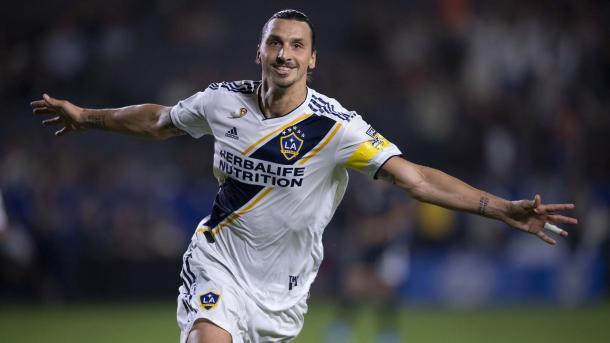
The 2018 season began afresh for the Galaxy, but only a return to success only became evident with the emphatic arrival of yet another star, Zlatan Ibrahimovic. Zlatan and Manchester United had mutually agreed to end his contract at Old Trafford after a nasty knee injury, freeing him up to join the Galaxy who pounced at the opportunity. And in true Zlatan fashion, he took out a full-page ad on the back cover of the Los Angeles Times writing five words, "Dear Los Angeles, You're Welcome" setting the tone for what MLS was about to have with Zlatan now on the payroll.
Zlatan's first game, the Galaxy's fourth of the season, kicked off what has become one of the most passionate, intense rivalries in MLS. The newly formed Los Angeles Football Club, LAFC, were just starting their first season in the league and a shiny new playmaker of their own, Mexican star Carlos Vela. LAFC took a commanding lead 3-0 in the first El Trafico, the name of MLS' newest derby paying homage to the horrendous traffic seen at all hours of the day in Los Angeles, embarrassing the Galaxy in front of their own home fans. With Zlatan on the bench having just arrived in Los Angeles the day before, the home crowd started chanting "We Want Zlatan," pleading for manager Sigi Schmid to throw him on for the final minutes of the game. With the Galaxy trailing 3-1, the fans got Zlatan with 19 minutes to go. And within five minutes, Zlatan was the latest megastar to captivate MLS. After the Galaxy had pulled back another goal to make it 3-2, Zlatan did more than introduce himself to the Galaxy and MLS faithful. He smashed the door with a battering ram by chipping the keeper from 45 yards out with the most perfect of volleys sending the crowd into a frenzy. As Fox announced Stu Holden said, "LAFC [had] just been Zlataned." But the Swede didn't stop there. As normal time moved to stoppage time, Zlatan made his way into the box and Ashley Cole sent in a cross. And wouldn't you know it, Zlatan beat everyone in the box to meet the ball and head it past the keeper to complete the epic comeback and win the game 4-3. Zlatan announced himself to the few American and MLS fans who did not know him and made sure they’d never forget. Moreover, the newest rivalry in MLS was also about to become the biggest and baddest. As the season went on though, even the star power was not enough as the Galaxy failed to make the playoffs in 2018 for a second year in a row.
2019 brought a renewed send of hope for the Galaxy. Zlatan was going to lead the team from the get-go under the new manager, former Boca Juniors manager, Guillermo Barros Schelotto, and the club was one of the teams selected for the inaugural Leagues Cup, the latest competition to pit MLS and Liga MX teams against each other. In the Leagues Cup, the Galaxy made it to the semifinals, ultimately losing to Cruz Azul 2-1. In MLS, the Galaxy finished a very mediocre 5th in the Western Conference but did qualify for the playoffs. In the new single-leg format of the playoffs, the Galaxy traveled to Minnesota United and upended them 2-1, setting up the Conference Semifinal against arch-rival LAFC in an ever increasingly fierce rivalry. In their regular-season meetings over the first two years, the Galaxy had never lost to LAFC and in their 2019 matchups alone, Zlatan had scored five against the expansion side. However, this time meeting in the playoffs with elimination on the line, it meant more. And the battle between Vela and Ibrahimovic was just as intense as the battle between the two clubs. MLS MVP Carlos Vela opened the scoring and collected his brace in the first half for LAFC. For the Galaxy, Argentine World Cup veteran Cristian Pavon, who had joined on loan just a few months earlier, pulled one back and Zlatan did the same. However, LAFC proved too much for the Galaxy and beat them for the first time in all competitions in club history, winning 5-3. And with that, the Zlatan era came to a close with no trophies and one postseason win. “Thanks, Zlatan. I guess.”
Present Day
To begin the 2020 season, the Galaxy were set to be without Zlatan, however, the club did retain Cristian Pavon's services for another year on loan and gave him a new strike partner upfront, Mexico's all team-leading goal scorer and legend, Javier "Chicharito" Hernandez. However, after just two games of the 2020 season, everything was shut down due to the Coronavirus outbreak around the world.


